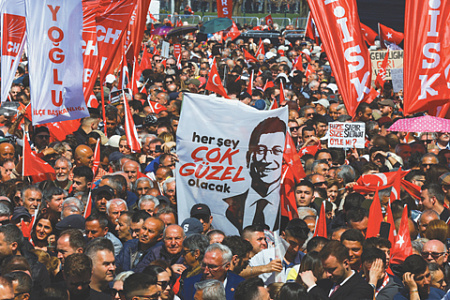
The Turkish opposition intends to organize a consumer boycott of those companies that represent the interests of President Recep Tayyip Erdogan. The chairman of the Republican People’s Party (CHP), Ozgur Ozel, blacklisted large holdings, in his opinion, associated with the authorities. Erdogan’s opponents want to protest the arrest of Istanbul mayor and prominent CHP member Ekrem Imamoglu. According to experts, if the Turkish economy continues to weaken, this may have a qualitative impact on the scale of the protest.
The CHP has decided to expand the list of Turkish companies that, in its opinion, should be boycotted in connection with the still-ongoing arrest of Ekrem Imamoglu, one of Erdogan’s key opponents.
Ozgur Ozel, chairman of the party, which holds the second largest number of parliamentary mandates in the national parliament, pointed out to his supporters the need to abandon the goods and services of the Dogus Group, an allegedly Erdogan–linked holding company whose huge portfolio includes construction companies, government media, energy and real estate firms, popular restaurants, and automotive companies. distributors. “Dogus Group will be buried underground,” promised the chairman of the RNP.
The RNP informed about the transition to the tactics of boycotting Turkish companies allegedly associated with Erdogan’s entourage a week ago. However, now the opposition is expanding its blacklist with new names – larger and related to Turkey’s vital infrastructure.
First of all, the call for a boycott is addressed to ordinary Turkish consumers who oppose the arrest of Imamoglu. However, as Ozel made clear in a recent interview, economic pressure on the ruling establishment may reach the level of public procurement. Thus, according to him, mayors and municipalities, a significant number of which the opposition party took control following the results of the 2024 municipal elections, may simply abandon the goods and services of the boycotted companies. RNP members are ready to abandon these products, even if it concerns quite important things, such as cars, Ozel stressed. He drew attention to the fact that the boycott should be effective in practice. The mechanism of such a boycott is also clear – through the public procurement system. This can be especially sensitive in cities.
Erdogan openly called the new measures of pressure from the opposition an attempt to “sabotage the economy.” According to him, such appeals, which have recently been heard from the RNP, should lead to real prosecution. The Association of Independent Industrialists and Entrepreneurs of Turkey also warned about the negative consequences of the boycott tactics. She issued a statement that the country could lose “economic achievements.” Given the critical impact of domestic consumption on economic growth, opposition calls may “negatively affect production and employment,” especially “in conditions of resistance to difficult circumstances,” the Association noted.
“The events of the last ten days and street terrorism are nothing more than an attempt to hide robberies,” Erdogan said yesterday, commenting on the protest activity of CHP supporters that began on the day of Imamoglu’s arrest. – As the investigation continues (against Imamoglu and other people who are working with him on the same cases. – “NG”) will advance and deepen, and it will undoubtedly be established where the tentacles of the criminal organization that has engulfed municipalities like an octopus are reaching.”
Despite the fact that the protest movement initially focused on the demand to release the Istanbul mayor, who, it is believed, could effectively compete with Erdogan in the 2028 presidential elections, the list of conditions is now expanding. The demonstrators are calling for an end to the repression, as well as the release of other political prisoners. Other political forces have now dissolved into the street movement, as well as student groups with their own agenda.
The demonstrators demand that the government, among other things, effectively combat the rapidly rising cost of living. The exchange rate of the Turkish lira and the stock market reacted sensitively to the detention of Imamoglu, which took place on March 19. The Central Bank of Turkey had to undertake large-scale interventions to stabilize the exchange rate of the national currency. For its part, the Finance Ministry held talks with foreign investors, trying to convince them that the street riots, which have become the largest in Turkey in about a decade, will not affect the national economy in any way.
However, foreign investors have begun to reduce their investments in Turkey over the past week, according to the Stratfor analytical center, which is close to the CIA. “If the political crisis and the capital outflow provoked by it do not ease in the coming weeks, the Turkish authorities will be forced to reduce currency interventions and allow a more significant adjustment of the exchange rate, which could lead to higher inflation,” writes Stratfor. The analytical center calculates that the growing economic pressure, the government’s response to the protests and the mobilization of the opposition “may allow the current protest movement to develop into a more serious challenge to the rule of President Erdogan.”
According to Stratfor estimates, if Turkey’s economic performance continues to deteriorate along with the persistence of protest dynamics, this may once again inflame the discontent of the general population with Ankara’s economic policy, especially against the background of the republic’s problems with high inflation. This will worsen the fragile position of the Turkish lira and weaken the government’s ability to respond effectively to the crisis, experts say. “Sustained protest mobilization, compounded by factors such as excessive police violence and economic discontent, may also encourage other opposition parties, such as the pro–Kurdish DEM Party, to join the movement, adding another layer to this threat to Erdogan’s rule,” the Stratfor researchers summarize.
